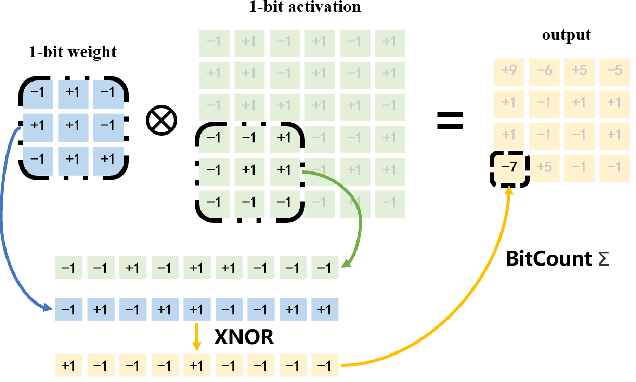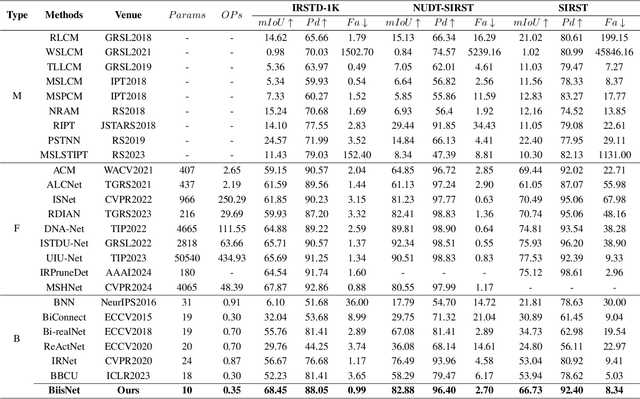Qianchen Mao
10K is Enough: An Ultra-Lightweight Binarized Network for Infrared Small-Target Detection
Mar 04, 2025



Abstract:The widespread deployment of InfRared Small-Target Detection(IRSTD) algorithms on edge devices necessitates the exploration of model compression techniques. Binary neural networks (BNNs) are distinguished by their exceptional efficiency in model compression. However, the small size of infrared targets introduces stringent precision requirements for the IRSTD task, while the inherent precision loss during binarization presents a significant challenge. To address this, we propose the Binarized Infrared Small-Target Detection Network (BiisNet), which preserves the core operations of binarized convolutions while integrating full-precision features into the network's information flow. Specifically, we propose the Dot-Binary Convolution, which retains fine-grained semantic information in feature maps while still leveraging the binarized convolution operations. In addition, we introduce a smooth and adaptive Dynamic Softsign function, which provides more comprehensive and progressively finer gradient during back-propagation, enhancing model stability and promoting an optimal weight distribution.Experimental results demonstrate that BiisNet not only significantly outperforms other binary architectures but also demonstrates strong competitiveness among state-of-the-art full-precision models.
SpirDet: Towards Efficient, Accurate and Lightweight Infrared Small Target Detector
Feb 08, 2024Abstract:In recent years, the detection of infrared small targets using deep learning methods has garnered substantial attention due to notable advancements. To improve the detection capability of small targets, these methods commonly maintain a pathway that preserves high-resolution features of sparse and tiny targets. However, it can result in redundant and expensive computations. To tackle this challenge, we propose SpirDet, a novel approach for efficient detection of infrared small targets. Specifically, to cope with the computational redundancy issue, we employ a new dual-branch sparse decoder to restore the feature map. Firstly, the fast branch directly predicts a sparse map indicating potential small target locations (occupying only 0.5\% area of the map). Secondly, the slow branch conducts fine-grained adjustments at the positions indicated by the sparse map. Additionally, we design an lightweight DO-RepEncoder based on reparameterization with the Downsampling Orthogonality, which can effectively reduce memory consumption and inference latency. Extensive experiments show that the proposed SpirDet significantly outperforms state-of-the-art models while achieving faster inference speed and fewer parameters. For example, on the IRSTD-1K dataset, SpirDet improves $MIoU$ by 4.7 and has a $7\times$ $FPS$ acceleration compared to the previous state-of-the-art model. The code will be open to the public.
 Add to Chrome
Add to Chrome Add to Firefox
Add to Firefox Add to Edge
Add to Edge